Trial for Domino's manager's slaying nears end
The state and defense argued Wednesday before a Wake County jury now considering whether a Raleigh man is guilty of first-degree murder in the January 2010 beating death of a Domino's assistant manager.
Posted — UpdatedBut Wake County prosecutors contended during closing arguments that the evidence was sufficient to prove that Travis Melton Sherman, 23, attacked Kenneth Edward Ring, 23, possibly with a baseball bat, while he was closing the Knightdale pizza store on Jan. 9, 2010.
Ring died two days later as a result of blunt force injury – "two violent shots" to the back of the head, according to Wake County Assistant District Attorney Doug Faucette.
"Credible evidence, indeed, shows that Travis Sherman, alone, entered the Domino's and fatally assaulted and robbed Kenny Ring," Faucette said.
But not so, defense attorney Dan Dolan told jurors before they began deliberating late in the afternoon.
"(There was) no murder weapon, no baseball bat, no DNA, no eye witnesses, no forensic evidence," Dolan said. "Nothing that can link Travis Sherman to this offense except speculation and surmise."
The state's case centered around two key witnesses –Timmy Crandall, an inmate at the Wake County jail, and Tracie Whitehouse, the mother of Nicho Bowers, another man charged in Ring's death.
Bowers, who found Ring and called 911, was a delivery driver and close friend to Sherman – the pair considered themselves to be brothers.
Both Whitehouse and Crandall testified that Sherman admitted to them that he attacked Ring. Whitehouse said he told her in the dining room of the home they shared. Crandall learned about details of the attack in a dozen "highly incriminating" jailhouse letters.
"The content of the letters and amount (of information) disclosed would only be known by Travis Sherman," Faucette said.
But the defense, who called no witnesses during the trial, said that neither Whitehouse nor Sherman were credible.
"Every one of these folks has an interest to tell something that is going to help them out," he said.
Crandall, who is still in jail, is trying to get out, Dolan said, and prosecutors couldn't corroborate his story with witnesses who saw Sherman exchanging letters with Crandall.
Whitehouse testified because prosecutors promised not to charge her with accessory after the fact to murder.
"She was concerned for herself and her son," he said. "She doesn't care about Travis."
Other evidence also came up short in proving that Sherman was Ring's killer, Dolan said.
Faucette said Sherman and Bowers made more than two dozen calls prior to the attack and that GPS records showed Sherman had been in the area at the time of the attack, despite his alibi that he was with his ex-girlfriend.
But Dolan said there was no evidence presented in the trial that Sherman was the one who was actually using the phone that night.
"There's no evidence here to say who had the phone," he said. "You can speculate … but that's not your job. Your job is to find the facts, not to speculate, not to guess."
Sherman's own admission to being present for the crime is another factor for the jury to consider, Faucette said.
In September 2010, Sherman admitted to being a lookout while another man robbed the store. He told Knightdale police that Ring was in on a plan to rob the store and that they had planned for Ring to be hit in the head.
"It's of no consequence, whether you're a lookout or actually did it," Faucette said, telling jurors that, under North Carolina law, being present when a crime occurs is the same as committing it.
He also questioned Sherman's story about Ring being involved in that plan.
"Why do you need a lookout if Kenny Ring is complicit? It makes no sense to be a lookout if Kenny Ring was complicit in this," Faucette said.
Dolan reminded jurors that Knightdale police – initially investigating only a robbery – made a number of mistakes in their probe of the town's first homicide.
Crime scene evidence was contaminated, police failed to preserve the crime scene and collect blood, and videos of police interviews were faulty, he said. Neither Sherman's DNA nor fingerprints were found at the scene, and investigators ignored a tire iron found near Ring's body.
Investigators were also never able to find a murder weapon.
"This case is all about inept police work, a bad investigation, interested witnesses and distorted evidence," Dolan said. "We know no more, right now, than we did 2½ weeks ago as to whether or not Mr. Travis Sherman is the person who committed the crimes at Domino’s."
• Credits
Copyright 2024 by Capitol Broadcasting Company. All rights reserved. This material may not be published, broadcast, rewritten or redistributed.






